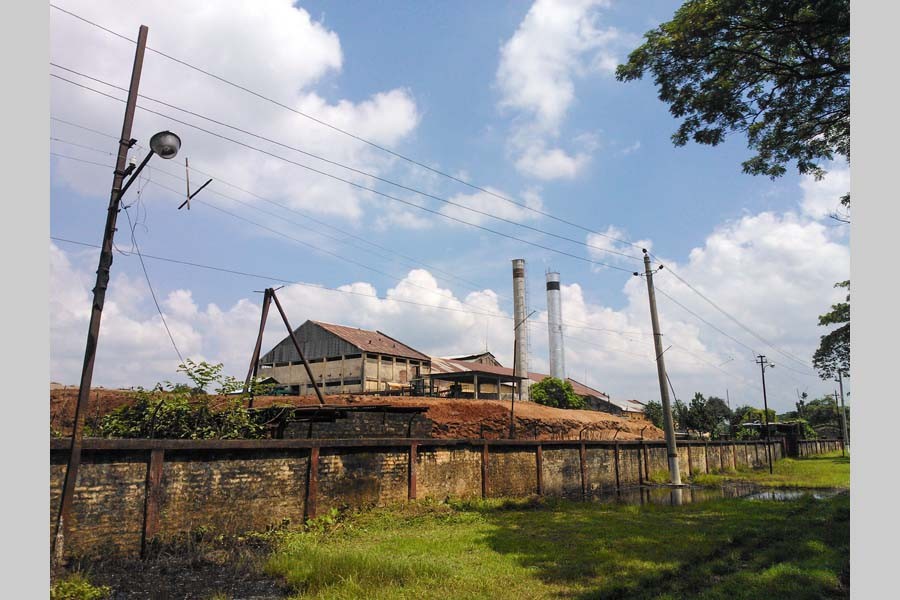
Published :
Updated :

The pitiable state of a state-owned sugar mill has been highlighted in a report published in the last Sunday's issue of a leading vernacular daily of the country.
The management of Rajshahi Sugar Mills, according to the report, is now forcing their workers and employees to accept sugar in lieu of cash as their monthly wage.
Mired in deep financial trouble, the sugar mill has failed to pay wages to workers and employees for five months in a row and has now taken recourse to paying in kind. Fighting for survival as they are, the workers and employees have no choice but to surrender to the bizarre treatment. But while doing so they are allegedly counting losses. There is a mismatch between the price of sugar fixed by the mill management and the price offered by the sugar traders in the open market. The price gap is equivalent to about 15 to 16 per cent of their wages.
The workers and employees should consider them rather lucky as the mill management has not proposed to adjust the actual production cost of sugar with their monthly wages. The cost of production in state sugar mills is around Tk.85 a kilogramme (kg) and their selling price is Tk.50 a kg. The price of sugar imported by the private traders is between Tk. 42 and Tk.44 a kg.
The state-owned sugar mills have been failing to dispose of their produce because of the price gap. These mills do have a large stock of disposable sugar in their warehouses. The Rajshahi Sugar mill is no exception. It reportedly has a stock of unsold sugar worth Tk. 600 million.
One has reasons to express anguish over the existence of the sugar mills in the public sector under the prevailing circumstances. Why should the government allow state-owned production units that are highly inefficient? Why should the government waste taxpayers' money on sugar mills that cannot sell their produce because of abnormally high cost of production?
The reason behind the government's reluctance to close down the loss-making sugar mills is not understandable. Is it for helping the sugarcane growers or the workers employed in these mills?
The government had closed down or divested many loss-making jute mills in the past. Giving protection to jute growers or workers was not considered a valid reason for carrying on with the loss-making jute mills. Why should it be different in the case of loss-making sugar mills?
The public sector sugar mills have been incurring substantial losses every year and there is no ground to hope any improvement in the situation. Rather, things might deteriorate further in the future.
The government cannot stop private import of sugar and force the consumer to buy sugar produced by the state sugar mills at abnormally high prices. Those days are gone when the people had to pay for the incompetence and inefficiency of the state-owned production units. But the truth is that the people do still pay for the weaknesses of the state enterprises, indirectly. The government pays subsidies almost regularly to a good number of state enterprises from the state coffer.
It is argued that subsidy payment is necessary to help keep prices/rates of some essentials and services in the interest of the poor and low-income people. On the surface, such arguments do appear tenable and hence popular. But a close scrutiny of the situation on the ground might lead to a different conclusion.
For instance, the government provides a substantial amount to the Bangladesh Power Development Board (BPDB) as subsidy with a view to keeping the power tariff within the 'reach' of the low and fixed income people.
But the government could eliminate subsidy payment fully or to a large extent had it been possible on its part to reduce substantially the so-called systems loss and massive financial irregularities in the power sector.
Most people tend to believe that the corrupt elements in the power sector regularise the pilferage of power under the 'saystems loss' head. The entry of private liquid fuel-based rental power plants under a non-transparent system since 2010 has increased the volume of subsidy, meant for the power sector, manifold.
The government uses nearly 12 per cent of its non-development budget on subsidies and incentives. It is a huge sum. There are instances of subsidy-abuse. But what is most galling is the allocation of subsidy for the sustenance of inefficient state enterprises.
The state sugar mills are strong candidates for either closure or divestment. The government could bring down the recurring expenditures on account of subsidies given to these mills only if it used the golden handshake programme for workers and employees of these production units.
One need not be an economist to question the viability of an enterprise if the cost of goods it produces is more than double of the market price. It would be, however, unfair to single out state sugar mills. There are other state enterprises which are equally inefficient and loss-making and do deserve either liquidation or divestment.


 For all latest news, follow The Financial Express Google News channel.
For all latest news, follow The Financial Express Google News channel.